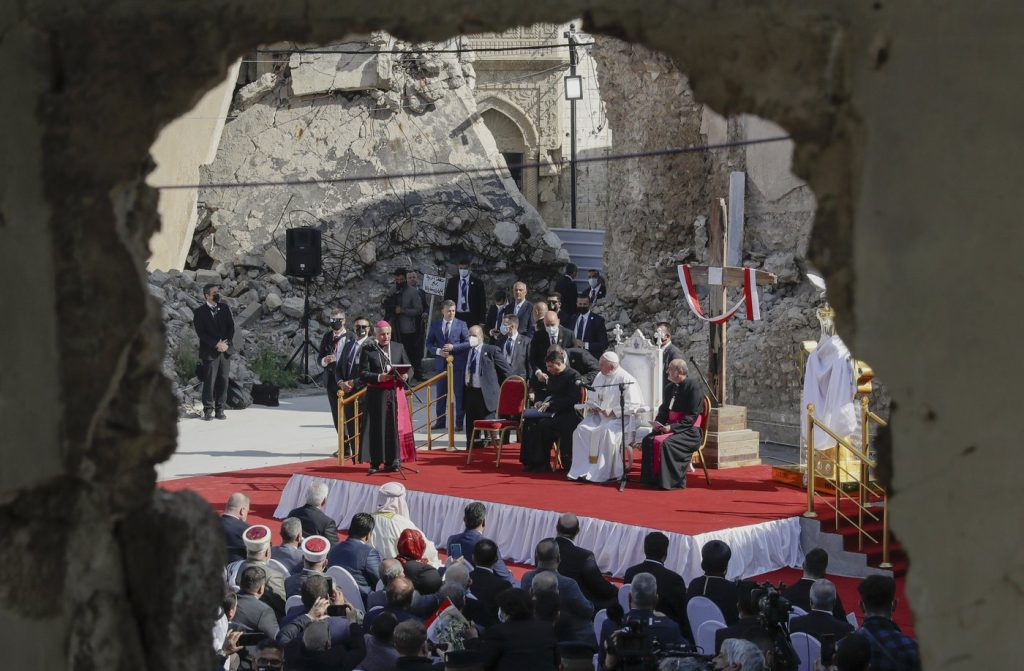BAGHDAD (AP) – The death of Pope Francis has reverberated deeply within Iraq's Christian community. His past visit to the country had introduced hope after turbulent years, and the impact of his 2021 visit lingers profoundly. This visit, which marked the first time a pope entered Iraq, occurred when the nation was just beginning to recover from the devastation caused by Islamic State militants.
Pope Francis's trip in March 2021 came as many Iraqi Christians were still displaced due to the violence that had forced them to flee their homes. The population of Christians in Iraq had plummeted from over a million, significantly impacted by decades of warfare and mass emigration. In Mosul, a city characterized by brutal confrontations between Iraqi forces and ISIS, Chaldean Archbishop Najeeb Moussa Michaeel recounted the joy his visit brought to the community, likening it to a wedding celebration.
That day, as the pope spoke in the devastated al-Midan area of Mosul, Archbishop Michaeel observed tears streaming down his face. Sa’dullah Rassam, who had fled Mosul in 2014, vividly remembered the moment, shedding tears as the pope left the church. Having spent years displaced in Irbil, Rassam returned to Mosul, residing close to the church Francis had visited. His encounter with Francis on that day remains unforgettable, as Rassam described the visit as a healing experience that made them feel loved.
The pope's presence stimulated a renewed commitment to rebuild Mosul, fostering reconstruction efforts for both Christian and Muslim places of worship. Michaeel noted that following the extensive media coverage of the pope’s trip, discussions around investing in the city gained momentum, prompting a revival of the area's cultural heritage.
Chaldean Patriarch Cardinal Louis Raphael Sako emphasized how Pope Francis nurtured essential relationships with Eastern rite churches and Muslim communities, often overlooked by their Latin counterparts. Sako recounted a prior conversation with Francis, where he advocated for the acknowledgment of Muslim communities. In response, the pope ensured that Muslims were mentioned in subsequent speeches, demonstrating his commitment to fostering coexistence.
Throughout his papacy, Francis took concrete steps to elevate Muslim-Christian relationships, visiting predominantly Muslim nations such as Egypt, the United Arab Emirates, and Iraq. His actions emphasized shared values and commonalities among different faiths. Sako articulated that the visit to Iraq transformed its international reputation, as people admired the pope for his authenticity and simplicity.
During his time in Iraq, Pope Francis also engaged in a historic dialogue with Grand Ayatollah Ali al-Sistani in Najaf, addressing the importance of peaceful coexistence. Sistani's office expressed profound sorrow at the news of the pope's passing, recognizing him for his commitment to advocating peace and tolerance globally.
Many Iraqi Christians fondly remembered the pope as "our favorite pope,” a sentiment echoed by Marvel Rassam from Irbil, who highlighted the communal spirit during the pope's visit. The atmosphere during the Mass he led at St. Joseph Chaldean Cathedral was particularly poignant, with church pastor Nadhir Dako remarking on its significance amidst ongoing trauma from the ISIS attacks. The pope's presence created a sense of unity and determination among all Iraqis to support their Christian counterparts during a challenging period.











